

Changing our (Dis)Course: A Distinctive Social Justice Aligned Definition of Open Education. Sarah R.
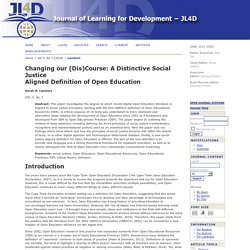
Lambert VOL. 5, No. 3 Abstract: This paper investigates the degree to which recent digital Open Education literature is aligned to social justice principles, starting with the first UNESCO definition of Open Educational Resources (OER). A critical analysis of 19 texts was undertaken to track dominant and alternative ideas shaping the development of Open Education since 2002 as it broadened and developed from OER to Open Educational Practices (OEP). It’s time to anticipate child rights issues in designing online services and policies for their use. The internet offers a range of advantages but also a multitude of risks for children who are using it.
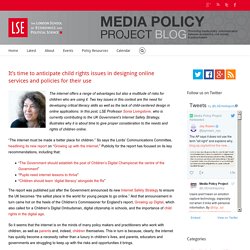
Two key issues in this context are the need for developing critical literacy skills as well as the lack of child-centered design in online applications. In this post, LSE Professor Sonia Livingstone, who is currently contributing to the UK Government’s Internet Safety Strategy, illustrates why it is about time to give proper consideration to the needs and rights of children online. “The internet must be made a better place for children.” So says the Lords’ Communications Committee, headlining its new report on “Growing up with the internet.” Publicity for the report has focused on its key recommendations, including that: The report was published just after the Government announced its new Internet Safety Strategy to ensure the UK becomes “the safest place in the world for young people to go online.”
LN306 student suggestions. Solving big problems. Towards complexity-informed language teaching in higher education. Abstract : To what extent is it possible to adopt “complexity-informed perspectives” (Mercer, 2013) for language teaching in higher education?
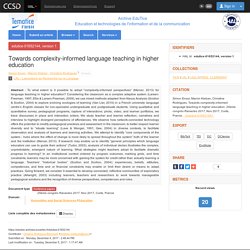
Liberating Structures - 6. TRIZ. Making Space with TRIZ Stop Counterproductive Activities and Behaviors to Make Space for Innovation (35 min.)
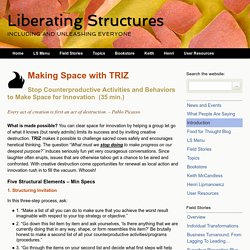
Every act of creation is first an act of destruction. – Pablo Picasso What is made possible? Open Access definitions vary but authors must be reminded that giving up copyright is just folly. The heart of the debate on open access to research is over licencing.
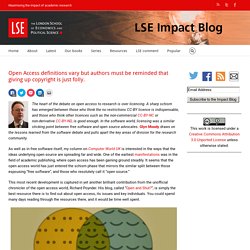
A sharp schism has emerged between those who think the no restrictions CC-BY licence is indispensable, and those who think other licences such as the non-commercial CC-BY-NC or non-derivative CC-BY-ND, is good enough. In the software world, licensing was a similar sticking point between free software and open source advocates. Glyn Moody draws on the lessons learned from the software debate and pulls apart the key areas of division for the research community. As well as in free software itself, my column on Computer World UK is interested in the ways that the ideas underlying open source are spreading far and wide. Google Spent 2 Years Studying 180 Teams. The Most Successful Ones Shared These 5 Traits. Over the years, Google has embarked on countless quests, collected endless amounts of data, and spent millions trying to better understand its people.
One of the company's most interesting initiatives, Project Aristotle, gathered several of Google's best and brightest to help the organization codify the secrets to team effectiveness. Specifically, Google wanted to know why some teams excelled while others fell behind. Before this study, like many other organizations, Google execs believed that building the best teams meant compiling the best people. It makes sense. Is the staggeringly profitable business of scientific publishing bad for science? N 2011, Claudio Aspesi, a senior investment analyst at Bernstein Research in London, made a bet that the dominant firm in one of the most lucrative industries in the world was headed for a crash.
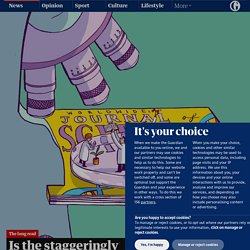
Reed-Elsevier, a multinational publishing giant with annual revenues exceeding £6bn, was an investor’s darling. It was one of the few publishers that had successfully managed the transition to the internet, and a recent company report was predicting yet another year of growth. Aspesi, though, had reason to believe that that prediction – along with those of every other major financial analyst – was wrong. The core of Elsevier’s operation is in scientific journals, the weekly or monthly publications in which scientists share their results. Critical and Alternative Perspectives on Student Engagement. When you have a graduate degree in higher education, student engagement is everything.
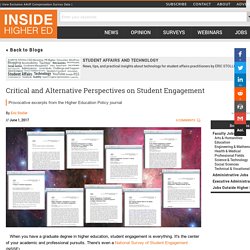
It's the center of your academic and professional pursuits. There's even a National Survey of Student Engagement (NSSE). The NSSE organization defines student engagement as “the amount of time and effort students put into their studies and other educationally purposeful activities” and “how [an] institution deploys its resources and organizes [its] curriculum and other learning opportunities to get students to participate in activities that decades of research studies show are linked to student learning.”
Student engagement is generally accepted as being connected to academic success, retention, learning, and the student experience. It's a guiding force at most higher education institutions. Replication and Analysis of Ebbinghaus’ Forgetting Curve. Abstract We present a successful replication of Ebbinghaus’ classic forgetting curve from 1880 based on the method of savings.
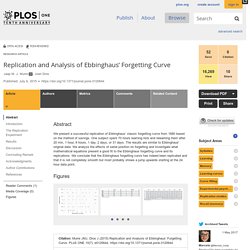
One subject spent 70 hours learning lists and relearning them after 20 min, 1 hour, 9 hours, 1 day, 2 days, or 31 days. The results are similar to Ebbinghaus' original data. We analyze the effects of serial position on forgetting and investigate what mathematical equations present a good fit to the Ebbinghaus forgetting curve and its replications. We conclude that the Ebbinghaus forgetting curve has indeed been replicated and that it is not completely smooth but most probably shows a jump upwards starting at the 24 hour data point. Education Endowment Foundation. Feedback is information given to the learner and/or the teacher about the learner’s performance relative to learning goals.
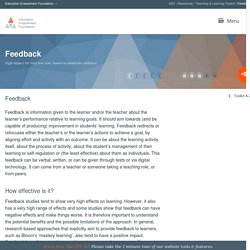
It should aim towards (and be capable of producing) improvement in students’ learning. Feedback redirects or refocuses either the teacher’s or the learner’s actions to achieve a goal, by aligning effort and activity with an outcome. It can be about the learning activity itself, about the process of activity, about the student’s management of their learning or self-regulation or (the least effective) about them as individuals.
This feedback can be verbal, written, or can be given through tests or via digital technology. It can come from a teacher or someone taking a teaching role, or from peers. BBC fools HSBC voice recognition security system. Media playback is unsupported on your device Security software designed to prevent bank fraud has been fooled by a BBC reporter and his twin.
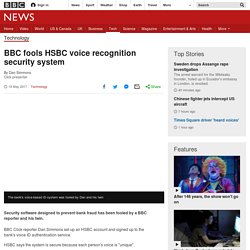
BBC Click reporter Dan Simmons set up an HSBC account and signed up to the bank's voice ID authentication service. HSBC says the system is secure because each person's voice is "unique". But the bank let Dan Simmons' non-identical twin, Joe, access the account via the telephone after he mimicked his brother's voice. Higher Education Policy, Volume 30, Issue 1. Open and Shut?: Copyright: the immoveable barrier that open access advocates underestimated. In calling for research papers to be made freely available open access advocates promised that doing so would lead to a simpler, less costly, more democratic, and more effective scholarly communication system. However, while the OA movement has succeeded in persuading research institutions and funders of the merits of open access, it has failed to win the hearts and minds of most researchers.
More importantly, it is not achieving its objectives. There are various reasons for this, but above all it is because OA advocates underestimated the extent to which copyright would subvert their cause. That is the argument I make in the text I link to below, and I include a personal case study that demonstrates the kind of problems copyright poses for open access. Individualized Learning is Great, but What About the Commonalities? Recently I wrote an article in reply to David E.’s question about the tensions between a growing focus upon individualized learning and common educational innovations. My reply to him was focused upon what we might be able to share in our education innovations that can help us better celebrate and nurture the unique potential of each learner.
Yet, his question can be read or understand in another way and I’d like to devote this article to that. They’re having fun… but are they learning? – MIT MEDIA LAB – Medium. By Anneli Hershman How can you measure the learning outcomes of play? This has frustrated professionals in the field of early childhood education for years. It has been well documented that play is an essential piece in children’s learning, especially in creative learning and motivation. But, without the means to directly measure how play facilitates academic achievements, it tends to be the first thing cut from early educational environments.
When researchers rely heavily on academic metrics to assess learning, we tend to blind ourselves to the bigger picture. Privacy is Power – Standard Journal. Interactive Toolkit. Tackle ‘reporting bias’ in pedagogy research, paper warns. Learning and teaching journals are “not doing enough” to combat reporting bias in research from the field, according to the author of a new paper on the subject. Phillip Dawson, associate director of the Centre for Research in Assessment and Digital Learning (Cradle) at Deakin University, also said that research funding organisations must help to reduce the phenomenon, which occurs when researchers selectively report significant positive results and omit non-significant or negative results. “When higher education research is used to inform practice, positive biases can falsely inflate our confidence that a particular learning and teaching approach is going to achieve the desired outcome,” his paper, “Sharing successes and hiding failures: ‘reporting bias’ in learning and teaching research”, states.
The study found reporting bias during a meta-analysis that compared lectures and active learning in science, technology, engineering and maths (STEM) disciplines. Higher education agencies for whom the Bell tolls. After a 2016 full of higher education policy news, you’d be forgiven for thinking that there could be no further surprises in store. WCAG-EM Report Tool. This tool helps you generate a report according to the Website Accessibility Conformance Evaluation Methodology (WCAG-EM).
22 Essential Tools for Testing Your Website's Usability. The Leadership Foundation: Leading Equality and Diversity. Interactive Toolkit. Valley of the dolts. In February 2012, after Facebook announced what was in time to become the largest IPO in the history of internet firms, The Economist put a parody of Mark Zuckerberg’s profile page on its cover.
How Educators Should Understand Hillary Clinton’s Server. #ReadMyResearch Education. Magazine - Creative academic. Evidence Rebuts Chomsky's Theory of Language Learning. How a Curious Condition Solved a Neuroscientific Mystery. Deepening reflection on practice with mobile technology. Workplace learning (WPL) provides students with a unique opportunity to reflect on professional practice. The flipped classroom model at the university: analysis based on professors’ and students’ assessment in the educational field. The Golden Triangle of Online Communication. Why Don’t Teachers Engage With Research? Formation à la recherche et recherche de la formation en didactique. Theconversation. The new (and much improved) ‘Bluebook’ caught in the copyright cross-hairs. The Paradox of Flow. Who will benefit from your research and who will block it? How to identify stakeholders so you can work together for impact.
Educational Neuroscience: Bridging the Gulf between Basic Research and Implications for Practice. Using experts ‘inexpertly’ leads to policy failure, warn researchers. Take Control of your Digital Identity. How should you be recording citations in the digital era? — Advice for authoring a PhD or academic book. About. Internet learning boosts performance by seven years, Sugata Mitra study finds. TimesHigherEducation sur Twitter : "The link between international collaboration, mobility and high-impact research: #THEAUS. We need more misfits in #education. Learning Design for Deep Learning. Redrawing the language map of the brain: Old beliefs upended as dementia research yields new locations for word, sentence comprehension. GLOBAL SOCIAL THEORY. Edtech Conferences You Need To Know. Research on Language and Social Interaction – Blog. GetDoc.do?type=COMPARL&reference=PE-549. 2014 EUROCALL Proceedings. Cross-border partners key to science breakthroughs Editorial - JIME OER13 special issue: The potential of openness for engaging communities.
The big grants, the big papers: are we missing something? How to survive a PhD viva: 17 top tips. How to get published in an academic journal: top tips from editors. The Researcher Development Framework. ? Abbreviations and acronyms dictionary. Top 10 Reasons Why LMS Implementation Fail. Technological support for ambitious institutions. Johannes Angermuller. Why the Myers-Briggs test is totally meaningless. Redirect Notice. School starting age: the evidence. Research in Germany - Do not disturb! How the brain filters out distractions. LUCIDE Final Conference: The future of the multilingual city.